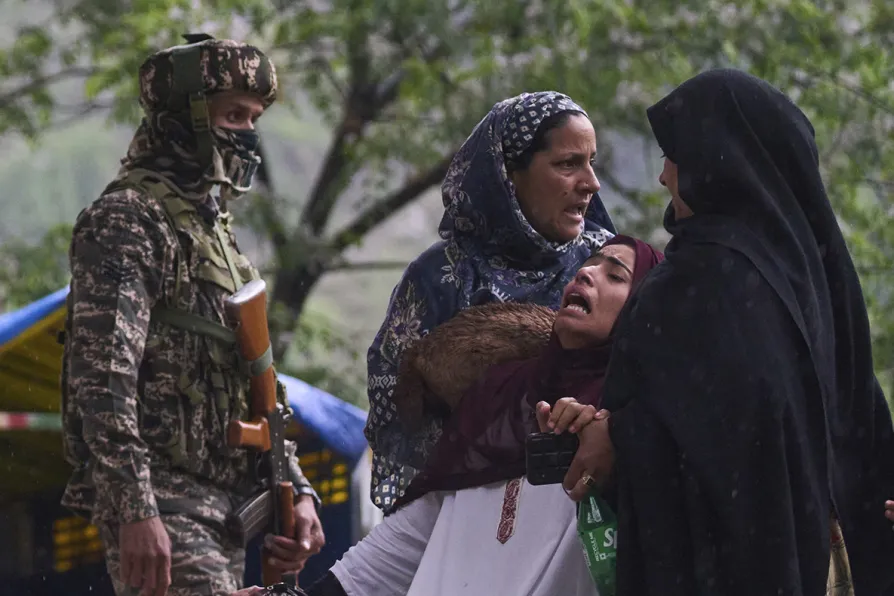
 Relatives comfort a Kashmiri women waiting for transportation as they leave following overnight shelling from Pakistan at Gingal village in Uri district, Indian-controlled Kashmir, May 9, 2025
Relatives comfort a Kashmiri women waiting for transportation as they leave following overnight shelling from Pakistan at Gingal village in Uri district, Indian-controlled Kashmir, May 9, 2025
AT LEAST five civilians have been killed as Indian and Pakistani soldiers exchanged heavy shelling and gunfire across their countries’ frontier in Kashmir.
Thursday night’s violence escalated a conflict that erupted following an attack on tourists in the India-controlled portion of the region, which both India and Pakistan claim in its entirety.
In Pakistan, an unusually intense night of artillery exchanges left at least four civilians dead and wounded 12 others in areas near the Line of Control that divides Kashmir, local police official Adeel Ahmad said. People in border towns said the firing had continued well into this morning.
Mohammad Shakil, who lives near the frontier in the Chakothi sector, said: “We’re used to hearing the exchange of fire between Pakistan and India at the Line of Control, but last night was different.”
In India, military officials said Pakistani troops had attacked their posts overnight with artillery, mortars and gunfire at multiple locations. They said that Indian soldiers had responded, triggering fierce exchanges.
A woman was killed and two other civilians were injured in the Uri sector, police said, taking India’s civilian death toll to 17 since Wednesday.
Tensions between the nuclear-armed rivals have soared since the attack on a popular tourist site in India-controlled Kashmir left 26 civilians dead, mostly Hindu Indian tourists, on April 22.
New Delhi has blamed Pakistan for backing the attack, an accusation that Islamabad rejects.
On Wednesday, India conducted air attacks on several sites in Pakistani territory that it claimed were militant-related, killing 31 civilians, according to Pakistani officials. Pakistan said it had shot down five Indian fighter jets.
On Thursday, each of the two countries reported drone attacks that the other swiftly denied.
In the northern Indian city of Dharamsala, a crowd of more than 10,000 people had to be evacuated from a stadium, according to reporters.
Meanwhile, several northern and western Indian states, including Punjab, Rajasthan and Indian-controlled Kashmir, shut schools and other educational institutions for two days.
Airlines in the country have also suspended flights from two dozen airports across the northern and western regions.
On Thursday night, India’s Civil Aviation Ministry issued a statement confirming the temporary closure of 24 airports.
As fears of military concentration soar and worried world leaders call for de-escalation, US Vice-President JD Vance said that a potential war between India and Pakistan would be “none of our business.”













